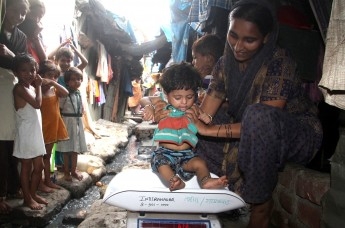
The winning entry from India exposed how Dengue fever and malaria are two of the most common causes of maternal death in Mumbai. (Credit: HT Media Ltd.)
Four reporters from BRIC nations (Brazil, Russia, India and China) won ICFJ’s 2014 Global Health Reporting Contest for outstanding coverage of maternal and child health issues. The journalists work for news organizations that reach a combined audience of more than 11.5 million.
The winners will be recognized for their reporting at an Awards Dinner on Sept. 22 at The New York Times Headquarters. They will also meet global health experts in Washington, D.C., Atlanta and New York as part of a 10-day study tour. Johnson & Johnson funded the contest.
At the Awards Dinner, science journalist Paul Raeburn will give a keynote address called “Maternal and Child Health: What’s Missing?” Raeburn is the author of the book “Do Fathers Matter? What Science Is Telling Us About the Parent We’ve Overlooked.” He also writes the About Fathers blog for Psychology Today magazine.
The contest aimed to raise public awareness of critical health topics concerning women and children. The winners from Brazil, China, India and Russia are:
• Mariana Della Barbra, a reporter for BBC Brasil, investigated why Brazil has become the world leader in births by caesarean section. Her report found that 52% of women in Brazil give birth by C-section. In some hospitals, she found that over 90% of babies are delivered this way, a trend that health experts are calling “the industry of Brazilian caesarean.”
ICFJ contest judge Fabiane Leite, a producer at TV Globo, said Della Barbra’s piece was thorough and “balanced,” shedding light on a growing health problem in Brazil.
• Yuan Duanduan, a reporter for the Southern Weekend in China, reported on the increasing number of Chinese mothers choosing not to breastfeed. She found that over the last 16 years, the rate of mothers breastfeeding dropped by nearly 40 percent. In cities, the rate of mothers breastfeeding is now just 15.8 percent.
Hujun Li, a reporter who worked for Caixin Media and Caijing Magazine called Yuan’s stories on the breastfeeding crisis impressive and that her reports caught the attention of policymakers.
• Priyanka Vora, a correspondent at the Hindustan Times in India, wrote an in-depth report showed how Dengue fever and malaria— both mosquito-borne illnesses— are emerging as two of the most common causes of maternal death in Mumbai.
After Vora’s stories were published, the government instructed clinics in Mumbai to monitor and test women in maternity wards for infectious disease such as TB and dengue, if they showed possible signs of these diseases, in order to prevent deaths.
• Olga Komarevtseva, a Russian journalist and filmmaker, produced a documentary on art therapy for children infected with HIV. The piece was aired at several international film festivals such as the STEPS International Rights Film Festival in Kharkiv, Ukraine.
Judge Viola Egikova, vice president of the European Union of Science Journalists’ Associations, said Egikova tackled a hot topic very creatively, showing that she “perfectly (masters) the material and the facts.”
To learn more about the contest, click here.